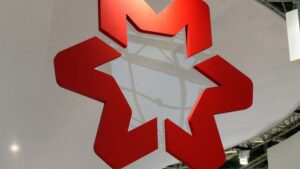
In 2025, Metinvest Mining and Metallurgical Group will invest almost UAH 5.7 billion in the development of its Kryvyi Rih mining and processing plants – Central, Ingulets and Northern mining and processing plants (MPPs), which were transformed into United Mining and Processing Plant (UMPP).
According to the press release, Metinvest will invest in the development of Kryvyi Rih mining and processing plants in 2025. The main investments will be aimed at maintaining key equipment, creating alternative sources of electricity and creating safe and comfortable workplaces. The company more than doubled its investments in iron ore assets compared to last year.
The largest part of the investments will be allocated for major repairs of equipment and facilities of the plants – more than UAH 1 billion. Investment projects are being implemented here to ensure the stability of production processes, reliable operation of transport and key equipment, and the fulfillment of product quality indicators to maintain competitive positions and reduce the cost of iron ore production. Funds are also planned for major overhauls of mining and processing equipment and power equipment.
Energy independence is also one of the priorities for the year to minimize technological risks for enterprises in the event of possible power outages. To this end, Northern and Central GOKs are planning to build gas reciprocating power plants with a total capacity of about 20 MW and solar generation with a capacity of 23 MW. A total of UAH 1.3 billion will be allocated for these projects.
“In 2025, the volume of investments in Kryvyi Rih GOKs will be increased, and like last year, the company’s investment strategy is focused primarily on maintaining the enterprises’ performance. As the war continues, the implementation of large-scale investment projects to modernize and build new production facilities in Ukraine is very limited. However, despite the difficult situation, the company continues to invest in development, adjusting its expenditure items to meet the needs and challenges of the day. For example, at GOKs, the key investment focus of the year is not only to maintain facilities and the fleet of operating equipment, but also to create energy autonomy for mining enterprises,” said Dmitry Nepomnyashchy, Director of Capital Construction and Investments at Metinvest GOKs.
In addition, in 2025, the active phase of the strategic project for the thickening of beneficiation waste at Pivdennyi GOK begins – this large-scale project is aimed at ensuring the transportation of thickened tailings to higher tailings storage levels after 2026. Additionally, it will reduce energy costs. In 2025, the company plans to spend UAH 1.4 billion.
The program to improve working conditions also remains relevant. This year, UAH 70 million will be allocated to create workplace conditions, including major repairs of amenity facilities in the administrative and amenity complexes of the plants’ structural units.
As reported earlier, Metinvest has implemented a new model for its Kryvyi Rih mining and processing facilities, bringing together its mining and processing plants in Kryvyi Rih under a single management.
“Metinvest comprises mining and metallurgical enterprises located in Ukraine, Europe and the United States. Its major shareholders are SCM Group (71.24%) and Smart Holding (23.76%), which jointly manage it.
Metinvest Holding LLC is the management company of Metinvest Group.
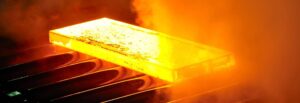
“Metinvest, Ukraine’s largest mining and metals holding, increased steel production by 4% year-on-year to 2.099 million tons in 2024.
According to the press release of the parent company Metinvest B.V. on its operating results for 2024, the production of total iron ore products increased by 42% to 15.733 million tons.
At the same time, the production of commercial iron ore increased by 58% to 14.826 million tons.
It is noted that capacity utilization in Ukraine was affected by factors such as security, personnel, electricity, logistics and economic factors.
Coke production in 2024 decreased by 10% to 1.122 million tons.
At the same time, Metinvest increased its total pellet production by 14% to 6.022 million tons, but reduced its total coking coal concentrate output by 22% to 4.277 million tons.
It is specified that in the fourth quarter of 2024, pig iron production at Kametstal decreased by 6% quarter-on-quarter to 452 thousand tons, mainly due to a short maintenance shutdown of blast furnace No. 9 in October. Crude steel production decreased by 14% quarter-on-quarter to 489 kt, driven by a shift in orders from finished products to commercial pig iron.
In 2024, pig iron production amounted to 1.818 million tons, up 3% year-on-year, thanks to the efficient operation of two blast furnaces. As a result, crude steel production increased by 4% year-on-year to 2,099 thousand tons.
In the fourth quarter of 2024, the production of semi-finished products amounted to 235 thousand tons (-6% q-o-q). Last year, the production of semi-finished products increased by 3% compared to 2023 to 861 thousand tons due to an increase in orders.
In the fourth quarter of 2024, production of finished products decreased by 2% quarter-on-quarter to 481 thousand tonnes, with flat products production increasing by 4% to 193 thousand tonnes due to an increase in hot-rolled plate production at Ferriera Valsider (Italy). Long products production fell by 6% to 288 thousand tonnes, mainly due to a reduction in the order book at Promet Steel (Bulgaria).
In 2024, production of finished products decreased by 6% to 2,159 thousand tons. In particular, flat products production fell by 16% to 922 thousand tons due to unfavorable European market conditions, especially the availability of cheaper Russian plates. This resulted in a lack of profitable orders for hot-rolled coils and a reduced order book for hot-rolled plates, the company said. At the same time, production of galvanized cold-rolled steel increased by 42% due to the resumption of inductor No. 4 at Unisteel in Ukraine after it was shut down for overhaul in the second quarter of 2023.
Long products production increased by 4% to 1,237 thousand tons, mainly due to a larger order book at Kamet Steel. Since February 2024, Russian troops have focused their efforts on several areas, including Pokrovske, close to Pokrovskugol. As a result, production there was suspended in December 2024.
In the fourth quarter of 2024, the Group’s production of coking coal concentrate decreased by 7% quarter-on-quarter to 1,057 thousand tons. The main factor was a 14% drop in production at Pokrovskugol to 566 thousand tons. At the same time, coal concentrate production at United Coal (USA) increased by 3% quarter-on-quarter to 491 thousand tons.
In 2024, the Group’s production of coking coal concentrate decreased primarily due to a 22% decline in production at Pokrovskugol to 2,426 thousand tons, mainly due to changes in geological conditions and events at the end of 2024. Coking coal concentrate output at United Coal decreased by 21% to 1,852 thousand tons due to downtime at Carter Roag and lower production at some Wellmore mines in 2023.
“Metinvest is a group of steel and mining companies located in Ukraine, Europe and the United States.
Its major shareholders are SCM Group (71.24%) and Smart Holding (23.76%), which jointly manage it.
Metinvest Holding LLC is the management company of Metinvest Group.
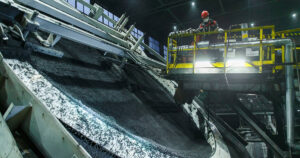
Metinvest Group’s Central, Ingulets and Northern Mining and Processing Plants (MPPs), which were transformed into United Mining and Processing Plant (UMPP), paid UAH 5.7 billion in taxes in 2024.
According to the company’s press release on Wednesday, in 2023, YuGOK, Central GOK and InGOK transferred UAH 2.2 billion to the state and municipal budgets.
“Thus, mining and processing enterprises remain a reliable pillar of Ukraine even during the war,” the press service states.
It is specified that in 2024, the main source of budget revenues was the tax on the use of subsoil, which amounted to UAH 2.7 billion. A significant share of deductions is accounted for by a single social contribution (UAH 673 million) and personal income tax (UAH 595 million). The environmental tax and land fees also contribute to the state and local budgets.
“It is the mining and metals companies that are the largest taxpayers and support the Ukrainian economy despite the war and challenges. These funds are needed for the social sector – healthcare, education, and most importantly, they support Ukraine’s defense capability. Metinvest’s Kryvyi Rih GOKs also remain one of the main employers in the region, providing jobs for thousands of specialists, including veterans returning from the war,” said Igor Tonev, CEO of Metinvest’s United GOKs.
As a reminder, Metinvest Group, including its associates and joint ventures, increased its payment of taxes and fees to budgets of all levels by 36% in 2024 to UAH 19.8 billion compared to 2023.
As reported earlier, Metinvest has implemented a new model for the operation of its Kryvyi Rih mining and processing enterprises, bringing together mining and processing plants in Kryvyi Rih under a single management.
In 2023, the Group’s Kryvyi Rih enterprises paid a total of UAH 4.6 billion in taxes and fees to the budgets of all levels.
“Metinvest comprises mining and metallurgical enterprises located in Ukraine, Europe and the United States. Its major shareholders are SCM Group (71.24%) and Smart Holding (23.76%), which jointly manage it.
Metinvest Holding LLC is the management company of Metinvest Group.
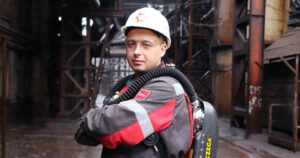
In 2025, Metinvest Mining and Metallurgical Group will invest more than UAH 2.5 billion to modernize Kametstal, a steel plant built at the facilities of Dnipro Metallurgical Plant (Kamianske, Dnipro region).
According to the press release, KAMETSTAL has launched a record investment program for 2025.
It is noted that in difficult wartime, KAMETSTAL, along with other Metinvest Group companies, continues to work systematically on construction and reconstruction to improve production reliability and efficiency. Since the first days of January 2025, the company has started implementing this year’s investment program with a total planned budget of over UAH 2.5 billion.
Among its most important items is the overhaul of blast furnace No. 9, which will account for almost a third of the program’s budget, as its primary objectives are to maintain the efficiency of the main equipment and technological processes to ensure stable production of commercial products.
Another priority is a pilot investment project to build an alternative power plant with solar panels. No such projects have been implemented at Metinvest’s enterprises before. Pre-project studies are currently underway, and practical ways to address this new challenge are being identified.
“This year, a record-breaking total budget of $59.8 million is being invested in the program, a significant part of which is aimed at maintaining and updating the main production equipment, which is a springboard for further development and modernization of the enterprise. In total, we plan to implement 114 investment projects of varying importance during the year. Key equipment will be overhauled in the main production shops. The resumption of production will allow the company to renew its presence and enter new markets for this product, thus generating additional profit,” said Mikhail Koptev, Director of Capital Construction and Investments at Kametstal.
The company’s plans to modernize the energy sector infrastructure include a significant focus on the construction of water pipelines. KAMETSTAL’s water and gas pipelines are long-distance communications that require systemic upgrades. In the near future, we plan to install water pipes for the blast furnace shop.
The 2025 program also includes the start of construction of the first start-up complex for a large-scale project to build a new blast furnace gas collector, and one of the most important reliability projects is the modernization of the drive control system for continuous casting machine (CCM) No. 1.
“Kametstal was created on the basis of PJSC Dnipro Coke and Chemical Plant (DCKhZ) and PJSC Dnipro Metallurgical Plant (DMK).
According to the 2020 report of Metinvest Group’s parent company, Metinvest B.V. (Netherlands) owned 100% of the shares in DCCP.

In 2024, Metinvest Mining and Metallurgical Group, including its associates and joint ventures, increased its payments to the budgets of all levels in Ukraine by 36% compared to 2023, to UAH 19.8 billion.
According to the company’s press release on Thursday, Metinvest has continued to support the country’s economy for almost three years of full-scale war.
The largest payment in terms of volume is the subsoil use fee, which has more than doubled year-on-year to UAH 5 billion. The second largest was the unified social tax of UAH 3.7 billion, up 13%. The top three largest payments include UAH 3.4 billion in personal income tax, which is 11% higher than in 2023.
In addition, Metinvest’s Ukrainian enterprises paid UAH 2.6 billion in corporate income tax last year, which is 20% less than in the previous year. Land payments increased by 6% year-on-year to UAH 1.3 billion, and environmental tax by 18% to UAH 717 million.
“The war increases the level of responsibility of business to the army, the economy and every Ukrainian. Despite all the challenges, we have not only maintained stability but also managed to reach the tax payment level of 2022, when we had a certain pre-war safety margin. This demonstrates our ability to adapt and find new opportunities. “Metinvest remains one of the largest taxpayers and private donors to the Armed Forces of Ukraine, and we continue to support the country in these difficult times,” said Yuriy Ryzhenkov, CEO of Metinvest.
As reported, Metinvest increased its tax payments by 38% to UAH 15.2 billion in the first nine months of 2024. In the first half of 2024, the Group increased its tax payments by one and a half times to UAH 10 billion. In total, in 2023, the company paid UAH 14.6 billion to the state budget.
“Metinvest is a vertically integrated group of steel and mining companies. The group’s enterprises are mainly located in Donetsk, Luhansk, Zaporizhzhia and Dnipro regions. The main shareholders of the holding are SCM Group (71.24%) and Smart Holding (23.76%), which jointly manage it.
Metinvest Holding LLC is the management company of Metinvest Group.
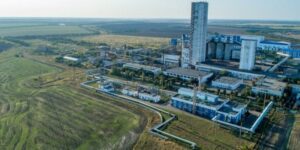
Metinvest Mining and Metallurgical Group announces the suspension of Pokrovsk Coal Group’s operations due to the changing situation on the frontline, electricity shortages and the deteriorating security situation, the company said in a stock exchange announcement on Tuesday.
“In connection with the suspension of Pokrovske Coal Group’s operations,Metinvest‘s management has developed a contingency plan to ensure the supply of the necessary raw materials (coal and coke) for steel production at the Group’s metallurgical assets (Kametstal and Zaporizhstal JV). The measures include the replacement of Ukrainian raw materials with coking coal from the US-based United Coal Company (part of Metinvest Group), the use of increased coal reserves, and additional supplies of coal and coke from third-party suppliers,” the statement said.
According to the press release, the full impact on the Group of the shutdown of the asset, whose production sites remain in the government-controlled territory of Ukraine, is currently being assessed.
At the same time, it is emphasized that the safety of employees is a priority for Metinvest, so the company facilitated the evacuation of Pokrovske Coal Group employees and their families. All employees who are not involved in the work stoppage process are offered paid retraining and employment at Metinvest’s assets in Zaporizhzhia, Kamianske and Kryvyi Rih. The evacuated employees are provided with financial assistance (lifting allowances, compensation for housing rent), free accommodation in hostels, and assistance for children (enrollment in kindergartens and schools).
“Pokrovskoye Coal Group is the energy heart of the Ukrainian steel industry and used to provide most of the export revenues to the Ukrainian budget. However, amid the daily deterioration of the situation, we cannot risk the safety of thousands of employees, as well as the lives of their families and children. Therefore, the suspension of the plant’s operations is a necessary step to help save lives. We believe in the victory of Ukraine, we believe in the Ukrainian Armed Forces and we are ready to resume the work of Pokrovske Coal Group and Pokrovsk itself after repelling the Russian invasion,” said Yuriy Ryzhenkov, CEO of the Group.
“Metinvest is a vertically integrated group of steel and mining companies. Its businesses are located in Ukraine, in Donetsk, Luhansk, Zaporizhzhia and Dnipro regions, as well as in Europe and the United States.
The major shareholders of Metinvest B.V. are SCM Group (71.24%) and Smart Holding Group (23.76%), which jointly manage the company. Metinvest Holding LLC is the management company of Metinvest Group.